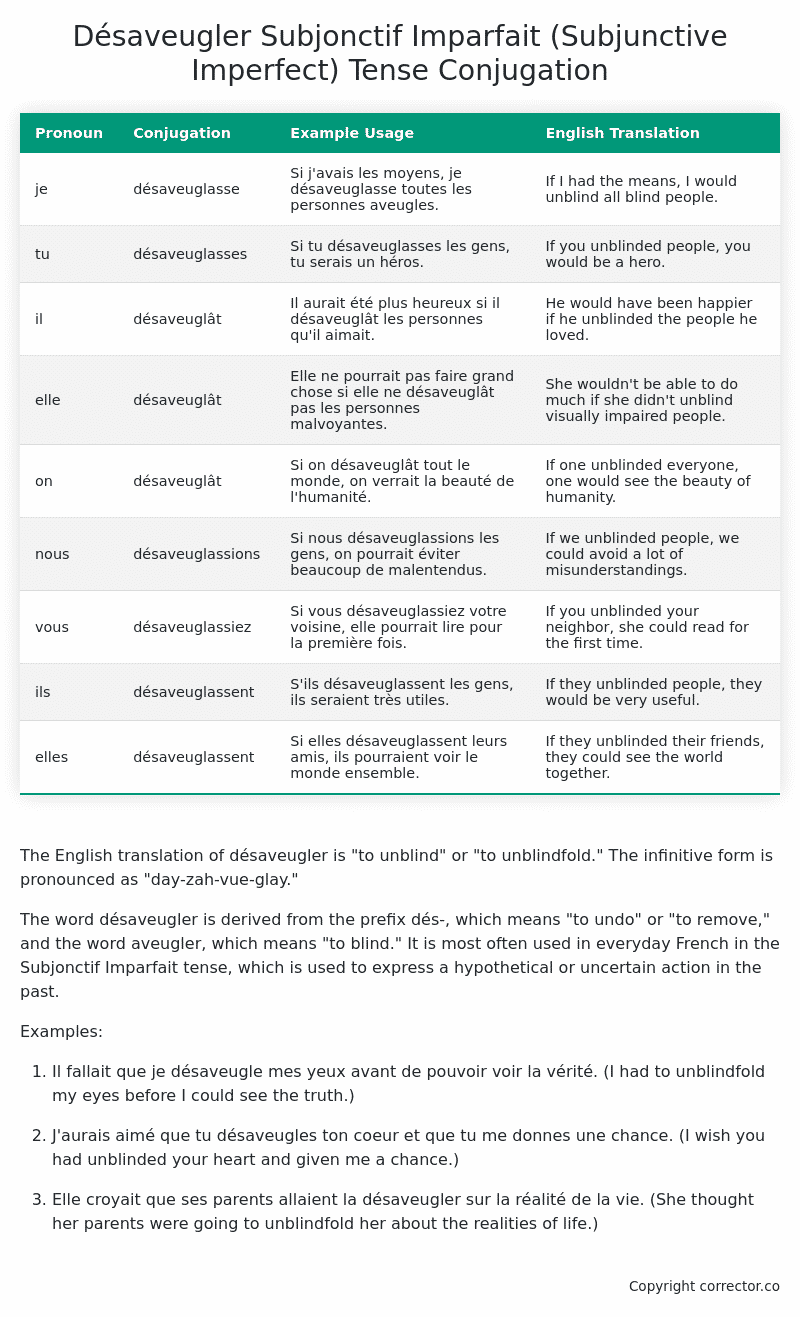Subjonctif Imparfait (Subjunctive Imperfect) Tense Conjugation of the French Verb désaveugler
Introduction to the verb désaveugler
The English translation of désaveugler is “to unblind” or “to unblindfold.” The infinitive form is pronounced as “day-zah-vue-glay.”
The word désaveugler is derived from the prefix dés-, which means “to undo” or “to remove,” and the word aveugler, which means “to blind.” It is most often used in everyday French in the Subjonctif Imparfait tense, which is used to express a hypothetical or uncertain action in the past.
Examples:
-
Il fallait que je désaveugle mes yeux avant de pouvoir voir la vérité. (I had to unblindfold my eyes before I could see the truth.)
-
J’aurais aimé que tu désaveugles ton coeur et que tu me donnes une chance. (I wish you had unblinded your heart and given me a chance.)
-
Elle croyait que ses parents allaient la désaveugler sur la réalité de la vie. (She thought her parents were going to unblindfold her about the realities of life.)
Table of the Subjonctif Imparfait (Subjunctive Imperfect) Tense Conjugation of désaveugler
| Pronoun | Conjugation | Example Usage | English Translation |
|---|---|---|---|
| je | désaveuglasse | Si j’avais les moyens, je désaveuglasse toutes les personnes aveugles. | If I had the means, I would unblind all blind people. |
| tu | désaveuglasses | Si tu désaveuglasses les gens, tu serais un héros. | If you unblinded people, you would be a hero. |
| il | désaveuglât | Il aurait été plus heureux si il désaveuglât les personnes qu’il aimait. | He would have been happier if he unblinded the people he loved. |
| elle | désaveuglât | Elle ne pourrait pas faire grand chose si elle ne désaveuglât pas les personnes malvoyantes. | She wouldn’t be able to do much if she didn’t unblind visually impaired people. |
| on | désaveuglât | Si on désaveuglât tout le monde, on verrait la beauté de l’humanité. | If one unblinded everyone, one would see the beauty of humanity. |
| nous | désaveuglassions | Si nous désaveuglassions les gens, on pourrait éviter beaucoup de malentendus. | If we unblinded people, we could avoid a lot of misunderstandings. |
| vous | désaveuglassiez | Si vous désaveuglassiez votre voisine, elle pourrait lire pour la première fois. | If you unblinded your neighbor, she could read for the first time. |
| ils | désaveuglassent | S’ils désaveuglassent les gens, ils seraient très utiles. | If they unblinded people, they would be very useful. |
| elles | désaveuglassent | Si elles désaveuglassent leurs amis, ils pourraient voir le monde ensemble. | If they unblinded their friends, they could see the world together. |
Other Conjugations for Désaveugler.
Le Present (Present Tense) Conjugation of the French Verb désaveugler
Imparfait (Imperfect) Tense Conjugation of the French Verb désaveugler
Passé Simple (Simple Past) Tense Conjugation of the French Verb désaveugler
Passé Composé (Present Perfect) Tense Conjugation of the French Verb désaveugler
Futur Simple (Simple Future) Tense Conjugation of the French Verb désaveugler
Futur Proche (Near Future) Tense Conjugation of the French Verb désaveugler
Plus-que-parfait (Pluperfect) Tense Conjugation of the French Verb désaveugler
Passé Antérieur (Past Anterior) Tense Conjugation of the French Verb désaveugler
Futur Antérieur (Future Anterior) Tense Conjugation of the French Verb désaveugler
Subjonctif Présent (Subjunctive Present) Tense Conjugation of the French Verb désaveugler
Subjonctif Passé (Subjunctive Past) Tense Conjugation of the French Verb désaveugler
Subjonctif Imparfait (Subjunctive Imperfect) Tense Conjugation of the French Verb désaveugler (this article)
Conditionnel Présent (Conditional Present) Tense Conjugation of the French Verb désaveugler
Conditionnel Passé (Conditional Past) Tense Conjugation of the French Verb désaveugler
L’impératif Présent (Imperative Present) Tense Conjugation of the French Verb désaveugler
L’infinitif Présent (Infinitive Present) Tense Conjugation of the French Verb désaveugler
Struggling with French verbs or the language in general? Why not use our free French Grammar Checker – no registration required!
Get a FREE Download Study Sheet of this Conjugation 🔥
Simply right click the image below, click “save image” and get your free reference for the désaveugler Subjonctif Imparfait tense conjugation!

Désaveugler – About the French Subjonctif Imparfait (Subjunctive Imperfect) Tense
Formation
Common Everyday Usage Patterns
Interactions with Other Tenses
Subjonctif Présent
Indicatif Passé Composé
Conditional
Conditional Perfect
Summary
I hope you enjoyed this article on the verb désaveugler. Still in a learning mood? Check out another TOTALLY random French verb conjugation!


